Last Updated on April 13, 2020
Something that is not widely discussed in the pet world is stress-induced seizures. While it is not something that is common, it can happen to any cat or dog. Dogs are more typically prone to this especially in purebreds, but that doesn’t mean it never happens with cats. Knowing how to recognize a stress-induced seizure vs a true medical problem will help you keep your cat happy and healthy.
What Causes Stress Seizures?
The short answer is obvious; STRESS! While it can take a lot of stress to make this happen, a cat who previously had a medical condition that caused them is more likely to experience them. The chances of it happening are also increased in cats who suffer from separation anxiety or bipolar syndrome.
Just like a human experiencing a panic attack under high amounts of stress, a cat can have mild seizures from high amounts of stress or after stressful situations. Things like being yelled at, getting into fights with other cats or animals, or a stressful move can induce them.
Are They Dangerous?
While they won’t hurt them directly, they can be hurt by accidents. When a cat has a stress seizure, they can easily fall off of a high place, bite their tongue, or get stuck somewhere. This can lead to other issues like head injuries and broken bones. It is important to watch over your cat when this is happening so they do not hurt themselves. Make sure they are on the floor and not biting their tongue.
What Does a Stress Seizure Look Like?
Typically, the cat will do a bellow or deep meow because they know something isn’t feeling right. They feel scared and are asking for help. This follows the cat either lying down or clasping over. They will tense their legs pretty stiffly and followed by this they usually become unresponsive. They may roll their eyes back, have their mouth open, and tense their neck as well. This usually only lasts 20 seconds to a minute long. As they come out of it, they will look exhausted and this is because they are. Some may go to walk only to lay back down after a few feet. It is very important to provide your cat with the opportunity to rest. Make sure they eat and/or drink shortly after this. They may need to rest several hours before they are feeling better so keep things peaceful around them.
Signs and symptoms to look for with serious medical problems:
- No appetite, not eating or drinking
- Wetting themselves before, during, or after the seizure
- Excessive panting
- Crying and uneasiness
- Signs of stomach or abdomen pain
- Hiding/wanting to be left alone
- Disorientation after the seizure has stopped
- Multiple seizures happening in a short amount of time
When to see a Veterinarian
If your cat is experiences anything from the above list, it is very important to take them to the vet ASAP. Those are common symptoms of Feline Pancreatitis which has a high fatality rate when left untreated.
If your cat appears fine after and you want to make sure, there is no harm in taking them in for a checkup. I do not advise putting them on medication for this. Simply removing the causes of stress will keep this from happening. I have personal experience with one of my cats and it rarely happens but when it does, he is back to normal a few hours later. Medication risks making them worse, causing them to happen more often, or just giving them other general health problems they don’t need.
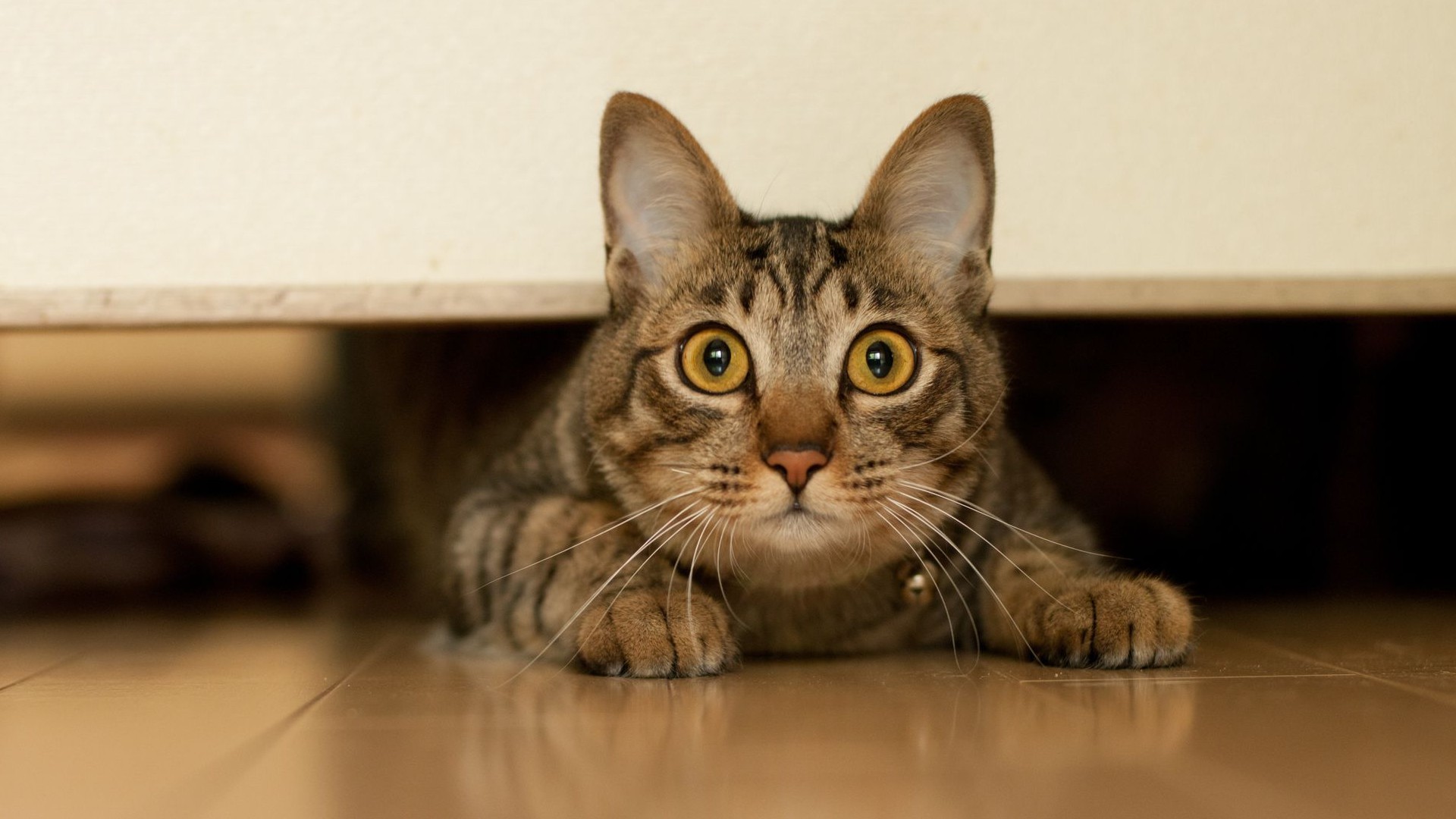
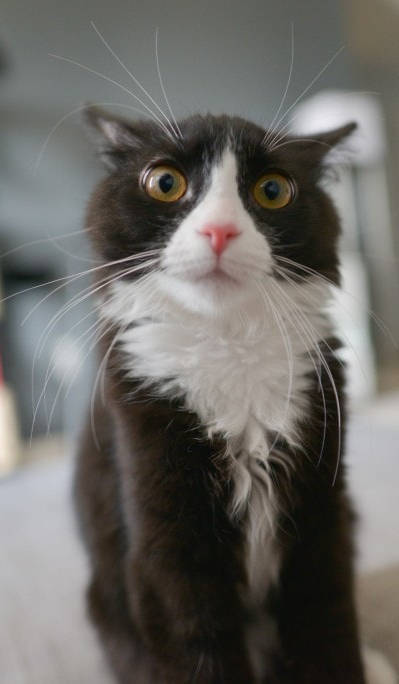
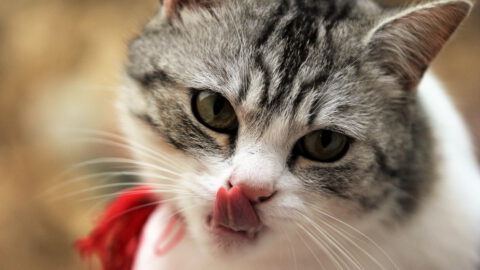

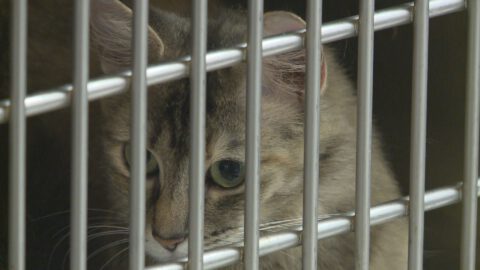
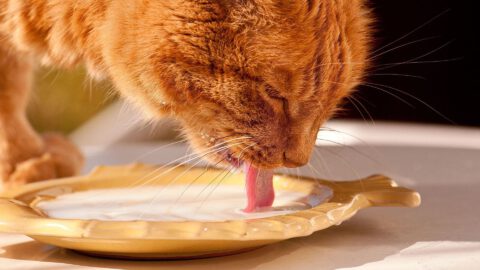
Heya, I’ve just come across this article and it looks very much like a couple of episodes my cats had. I was wondering if you had any sources for the information.
Thanks for your comment, Kirstie. As mentioned in the article, this comes from personal experience (of one of my own cats) working for and with a vet. A stress seizure is best explained to be similar to that of a panic attack. It is always best to get your cat examined by a vet to rule out any underlying causes.
May I ask what how dangerous a sign it is for them to urinate? Our 17 yr old cat has had two of these episodes. After the 1st, (about six months ago) we took him into the vet. They couldn’t find anything, but coincidently or not a family of loud crows had built a nest outside the cats favorite window. I wondered if their ruckus triggered a panic attack, but I didn’t know that was really possible.
Today it happened again. We found evidence of another cat urinating on our patio. Our cat did exactly as described about 5 minutes after checking the spot. I tried cleaning the spot, but you know. When he had his event, he urinated when I picked him up. I thought he had relaxed. Should I be more concerned? Thx!
Thanks for your comment, Carol. If it was indeed a stress seizure, it is normal for the bladder to be released. Stress seizures in particular cause the cat’s body to tense up severely which puts pressure on the bladder so it will release either during or just as a seizure is ending. Because your cat is starting this at an older age, I would suggest getting a second opinion from another vet just to make double sure there are no other medical issues happening here.
Hi.
I have a 3 yr old cat who was born feral, found her and sibs at 5 weeks. She definately wouldn”t have lasted the week…she was that near death from starving . She is a fragile sort, shy and easily spooked. She is is quite tame and sweet and quite healthy. Recently she has had 2 weird episodes. A few months ago, she got scared by the sweeper…tho isn’t usually scared of it. She was reacting to another cat’s fear of the sweeper, as that cat hates it. She started running around the house and ran into a cat tree and the sweeper. She ended up running under the bed…her fav hidey spot, but was moving oddly. (stiffly) Thinking she was injured I dug her out and she looked terrified…huge black eyes, ears back, body in a tight ball…breathing rapidly. I couldn’t calm her down at all…and she is super attached to me. She then proceeded to act even scarier…She put her paws over her ears and pulled her head down and she seemed like something neurological was happening. She didn’t recognize me and almost seemed like she was having a stoke or something. It was SO awful and scared me to death. We ran to Vet with her but they had closed 1/2 hour before we got there. On way home she kind of came around and was acting like nothing much had happened. She did hide when we got home, but came out 45 mins later totally fine, ate and acted normal. Vet said it sounded like a panic attack. Today she did it again…but had been on my lap and I have zero idea what scared her this time, except it was very windy outside. She ran away, again oddly and hid under bed. When I checked on her she was all weird acting again. Rapid breathing, huge pupils and in a stiff, tight ball and doing the pulling her head down with her paws. I couldn’t calm her and it took forever to go back to normal. She seemed very scared of me afterwards, like she attributed her episode to me having caused it. She seems very spacey and out of it when it’s happening. I had a panic attack myself, as she scared me so bad seeming like she was dying or something. I’m awfully attached to my little Catniss…I love her SO much. Could she be having panic attacks from being scared ?? I have never seen this in cats…and I’ve had cats forever. Thanks so much for any input.
Thanks for your comment Vicky. Yes, those are likely panic attacks. Her association with the panic episode and being near you is normal. She may need a bit of time to work through that. Most panic attacks are brought on by something fearful, different, or strange happening. It is hard to pinpoint triggers in cats as they don’t often show signs of anxiety prior to it becoming a panic attack. Just give her some time and see if they pass. They are completely harmless. Just reassure her with things she enjoys and don’t get upset or panic yourself if it happens again. Stay as calm as possible for her.
Thanks Perfect Love for the reassuring info. I REALLY appreciate the comment back. It is so hard to stay calm myself…as when Catniss is doing that it scares the crap out of me. But knowing she isn’t dying and will be ok shortly (or in her case…longly !!) I will try really really hard not to freak out myself. So, since she goes under the bed and is in her “safe spot” in her little cat bed…it’s probably best that I leave her alone and let her work it out then right? My presents doesn’t seem to help her what so ever anyhow…and escalates my panic. I have read that a hormonal thing is happening when a panic attack occurs, and it really can’t just end…until it has ran it’s course. True?? So strange that I have had her and her sister for 3 years this summer and only just recently has she had the 2 episodes. I wonder why I never saw her act like that til now. One more thing…I didn’t really understand when you were explaining her association with panic and being near me sentence…sorry…but it’s important to me to know what you meant. Thanks again for responding/reassuring me, as my Vet hasn’t been too helpful except to say she was probably experiencing a panic attack. I totally understand about panic attacks, as I too suffer from them at times and they are NO joke.
Panic attacks are spikes of adrenaline without real danger. Instead of the mind focusing on the “danger” it ends up focusing on the adrenaline rush happening in the body. It is a very scary experience to go through this for humans as well as animals. Her association with you and the panic attack is similar to a human being at someone’s house and having a panic attack there, then not wanting to go back. She is associating you with her bad experience because she wants to avoid it happening again. Anxiety-prone animals, just as humans, will do this with people, places, situations, objects, and so on. She will work through it herself once she realizes you are not part of the reason it happened. If you can’t remain calm around her when she is going through an attack, then yes it is best to just let her be. Just check on her calmly and quietly after 5 minutes. Some panic attacks last only a few minutes, others can last up to 20 or longer.
My 3.5 year old cat (male) has never shown any signs of illness, and he had what we assume was a seizure at the very end of December. It appears our 7 month old lab was chasing him, and he ran under the bed (where we have suitcases to keep the lab out from under the bed). Within moments, we heard a blood curdling sound, and we realized it was the cat. It was a hideous sound and it went on for a good 10-15 seconds. By the time we got to him, as he was in between a suitcase and the wall, all we could see was that he was shaking, and when he came out from under the bed, he was hunched down, and his tail was puffy. A little while later he was fine. We thought he might have hurt himself under the bed or possibly be a wire and got a bit of a zap. Nothing or 26 days, and then it happened again. I woke up to this hideous screaming again, and the cat was lying on his side, and he was having what appeared to be a seizure – he was stiff, and he was kicking one of his back legs, and his head was bobbing back and forth, but not extremely fast. (I had a dog with Epilepsy, and I know what seizures in animals look like). The dogs were watching over him, and my husband made them move back, and my other cat ran away. He also urinated, as it was a bit wet on the floor afterwards – no drooling. After the incident, my cat walked away hunched down and went under the dining room table, and he was growling a bit. Then 2 minutes later, my husband offered him some treats, and he jumped up onto the counter as if nothing happened. We took him to the vet, and we had a bunch of bloods on him testing for him everything under the sun. Everything came back perfect. If he was any more in the middle of all of the ranges, he’d be a bullseye. We were thinking about doing an MRI and possibly a spinal tap, but this has never happened before, and my husband and I work from home, so the time that we are home in the day opposed to the time we spend away from the house is greater, and the chances of the cat having had a seizure without us knowing and/or not being home is slight in comparison to us being home. I asked the vet if a cat can literally scare themselves into a fit, and she said it is unlikely, but not impossible – anything is possible. After the episodes, my other cat would hiss at him for a few days, and he especially got hissed at after the last episode, because we took him out of the house and to the vet – and the other cat always hisses at him after going to the vet – even if they go together. I’m so glad I found this article, as something just isn’t sitting right with me. The cat shows no signs of an Epileptic animal – no staring off into space, twitching here and there or anything else. When the lab was younger and much smaller, my cat would swat at him from time to time and bit him once or twice too. Now, the lab is 7.5 months old and much bigger, and since he is much bigger, is it possible that the cat gets scared now instead of swatting at him, and that’s what caused these seizure type episodes? I’m really wondering about this. The lab was born 6/15/19, and the first “seizure episode” in the cat was 12/30/19 – the dog was 6.5 months old, and anyone that has a lab knows that they are high energy animals, and they want to play, and they are very big at that age. The cat went from seeing this small 8 week old puppy to what is now a 70 lb lab. I also have a GSD, and she and the cat are buddies – she’s not afraid of her at all, and she mommies him. Thank you so much for this article – it makes sense.
Hello, i was wondering if you can help me. I think my cat had a seizure from being exposed to flea treatment about 2/3 months ago, he snapped out of if after about 10 minutes but since then he has been really really anxious, he lives with his sister (both spayed) and sometimes when she walks near him it’s like he doesn’t recognise that she lives here, they sniff each other and he relaxes but any sudden noise he’s so on edge and it’s all been hightened since the flea treatment incident. There also has been the odd occasion he has been spooked wee’d a little and puffed up but he’s managed to come around quite quickly. Is there anything I can do to relax him? I have things like feliway friends plug ins, should i try the classics for example ?
Thanks for your comment Leanne. Did you run this by his vet? It sounds like he may have had an allergic reaction to the flea treatment. What you are explaining sounds like general anxiety. I don’t think he is having full blown seizures but the first one may have been a panic attack. You can try feliway for starts and see if that helps. You will have to figure out what is stressing him out and go from there. All cats are different. Try to remember any changes in the household, be it new furniture, new pets, or new people coming around. Keep track of what is scaring him as well. Do you allow him to go outdoors unsupervised by chance? He may have gotten into a fight with a cat or may have been scared by another animal. Cats are naturally nearsighted so his sister’s figure might be spooking him until he is able to know it is her when she is closer.
Thank you for your reply, i didn’t take him to the vets but at the time of what I called a sezuire I ran the symptoms past a vet and they said to keep an eye on him. He’s an indoor cat. He is very anxious anyway and gets spooked easily it’s just strange that since that one incident it’s he I would say it’s got alot worse, and there has been two occasions where he has wee’d since he first time. I have feliway plug ins already but the ‘friends one as he chases sister sometimes. Not sure if I need the classic one….
Other than the flea treatment there hasn’t been any other changes to his life style.
Thanks
I would say just to keep an eye on him like the vet recommended. Try to make notes of anything that seems to scare him. The feliway spray that comes in the can is what I find most effective. You can use lavender scented cleaners around the home or scented lavender candles as well. This naturally will help to calm him down. Johnson and Johnson makes a baby shampoo/wash called “Bedtime Bath” that is lavender scented. I use this on my cats when they have their seasonal baths but I know a lot of cats do not allow themselves to be bathed. If he has any beds, pillows, or blankets, washing them with this soap can also help to ease some stress. The scent of lavender is very relaxing for humans as well as cats and dogs.
Thanks alot
I have a 9 year old Maine Coon. He had teeth extraction in June 2018. There were problems with him waking up from the anesthesia. He began to thrash around in his cage after the surgery and he was blind. We brought him home he was, toes could not see could not eat could not move his bowels could not pee could not stand. We have worked very hard with him and he gets around the house very good uses the litter box goes up and down the stairs. Some compulsive behavior began to appear, and the vet suggested putting him on Prozac. Prior to him being put on Prozac he did have an episode where he was sitting, began to growl, turn very very very very fast in circles, and began to run through the house. It was over in 30 to 45 seconds. Afterwards he scratched his head behind his ears and groomed.we began him on Prozac for the compulsive behavior of going up and down the stairs and and pacing constantly. I did also try flower remedies. 2 months after the Prozac he had another episode three times in one day a week later another episode. That put him on 1mg valium twice a day. I have weaned him off the Prozac. I really don’t think the Valium is doing anything for these episodes. The vet said they are panic attacks, but because of how this all came about and the damage to his neurological system oh, I do not know how to proceed. Do you have any suggestions? He does scratches behind his right ear and groom after each episode. These episodes remind me of what he experienced when he came out of anesthesia, the thrashing about that’s what it looks like.
Thanks for your comment Marty. I personally feel medication for panic attacks in cats can be more of a danger than a remedy. In order to stop the panic attacks, you have to either remove what is stressing him out completely or expose him to it a bit each day until he realizes it is not a threat and his body acts accordingly. Panic attacks are very treatable without medication but it takes work and time, especially with cats. I would start by finding out what is triggering his attacks and go from there. You may want to get a second opinion from another vet to make sure there isn’t any neurological damage and to make sure these aren’t seizures because of damage.
Hello, thanks for your post. I have been looking for answers around why my 1.5 yr old female cat Mila is having seizures and this is the first article I’ve found about stress seizures.
Mila had her first seizure at 3am in a terrible rain storm with lightening. She yowled and screamed for a minute or two and then violently thrashed her front and back legs for what felt like 2 minutes. The blanket she was on was very damp. For the rest of the day she was very quiet and disoriented. I took her to the vet and her blood results came back normal.
Her second seizure happened a month later after a car ride. When she started to get out of the cage she yowled and then her front and back legs thrashed and twitched for 30 seconds. She drooled quite a bit. It was not as bad as the first one. And she seemed ok two hours after.
Today, 3 weeks later she had her third seizure after a car ride to my parents house. She was very calm during the whole car ride. When we arrived I let her out of the cage and she walked around a bit then howled and thrashed her legs for about 30 seconds. Again lots of drool. She ate after and had water. I am very worried about her. Do you think this sounds like stress seizures and is there anything natural you can recommend?
Thanks very much.
Thanks for your comment Natasha. This sounds like she is having panic attacks at the result of being in a lot of fear. A panic attack can become a stress seizure and in some cases, they can appear to be the same thing. Panic attacks are tricky to treat with animals as it involves exposure to the stressor like with humans. If a person has a panic attack while in a car, they need to keep going in cars to get over the response. I don’t recommend putting her on medication unless there is a true medical concern here. The best approach is to reduce the stress by avoiding the triggers or build up her tolerance to them.
It would seem that car rides or being in a cage is a trigger for her, it could be both. You can try putting her in the cage for a few minutes every day and just rewarding her for being in it to allow her to feel comfortable in the cage. Then you can do short trips with her in the car. Just drive around for 5 to 10 minutes and bring her back home. It can take some time but this should help her. She needs to understand that she is not in danger and can feel safe in the car and in the cage. You can’t help when a thunderstorm will happen but when you know one is coming, you can allow her to have a safe space where the windows are covered and she can feel secure.
Thank you so much for the reply. I had not read about panic attacks before so that is helpful. I will try your suggestions. Again, many thanks.
Hi natasha
Seems like your cat’s prob is the same as mine.coz im stress myself thinking why is my cat having seizures whenever we try to put him in his carrier.he will be kicking all his legs front n back,drooling and wetting himself at the same time. The 2nd time he had his seizures when we tried to put him in a basket trolley as we were scared if hes phobia with carrier.after few mins in the trolley he started his seizures again. Im trying to think of an idea to bring him to the vet to sterilise him but then he will have seizures if put in carrier.
Hi, Mila had another seizure when not in the carrier, she was stressed from her brother chasing her and ran under the couch and had a very bad episode. So I decided to try a product called EaseSure. She gets two drops every night and has not had a seizure for three weeks. I bought it because of all the positive reviews. Here is a link to it https://m.onlynaturalpet.com/products/PetAlive-EaseSure-S/230023.aspx